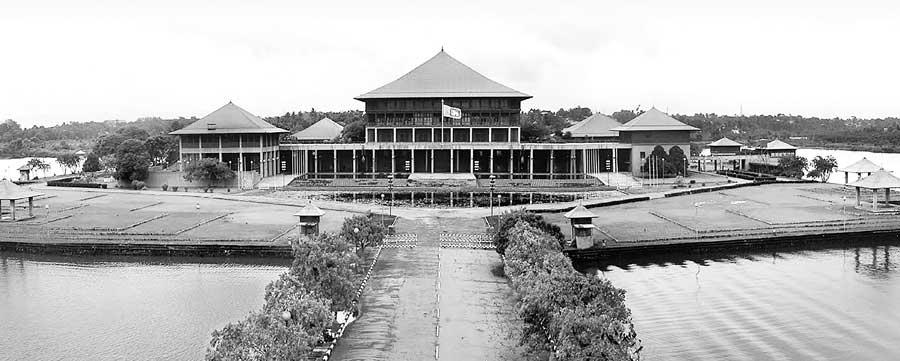Reply To:
Name - Reply Comment

Parliament in Sri Lanka, had abused the freedom of their members and ignored their constitutional functions; eighty percent of them do not deserve any privileges
18th-century French philosopher Charles de Montesquieu coined the term ‘trias politica.’ He says in his book, ‘The Spirit of the Laws -1748’ that a nation’s freedom depended on the three powers of governance — Legislative, Executive, and Judicial. The United States Constitution of 1787 incorporated the doctrine with a system of checks and balances where the judiciary is endowed with the power of judicial review of legislative and executive activity.
Spirit of the Laws -1748’ that a nation’s freedom depended on the three powers of governance — Legislative, Executive, and Judicial. The United States Constitution of 1787 incorporated the doctrine with a system of checks and balances where the judiciary is endowed with the power of judicial review of legislative and executive activity.
In the United Kingdom, Parliament does not discuss certain issues if it has to be submitted to the court for the hearing. Parliament is prohibited from criticizing judges. However, UK assumes Parliamentary Supremacy; hence it has powers to inspire the judiciary. Parliament can dismiss court decisions through new legislation and the judiciary interprets the legislation passed by the legislature. Therefore, courts are also said to enact the law, especially in cases where there is a vacuum [no law for certain areas.] All in all, the separation of powers with its inevitable overlapping, is mainly theoretical and in reality it is not practiced. The judiciary should be free and independent to protect the rights and liberties of citizens without influence or pressure from any parties. The executive’s powers have to be curtailed and the legislature should be constrained in their power to enact any law as they like. This is to prevent the abuse of powers by the organs which may affect the basic rights and liberties of the citizens. The judiciary should be given more powers to enable them to perform their functions neutrally and independently without fear or favour by any party, and also the powers to check on legislative and executive more effectually.
More than half of the 37 OECD countries, that includes the UK, USA, Germany, France, Switzerland, Spain, and Canada, report substantial powers to amend their budgets without judicial intervention; not widely used in practice though.
The history of budgets is full of significant variations in stated budget allocations and actual spending. In Sri Lanka, statistics show that the discrepancy between allocations and actual spending on the agricultural sector has increased every year; 2011— 23%, in 2012 –34% and a huge 67% percent in 2013. If a farmer in the North Central appeals to courts for redress over the refusal to grant allocated funds by government bureaucracy, what would have been the outcome?
Budgetary allocations can be transferred to cover expenses under other ministries without parliamentary approval. It is carried out through the approval and endorsement of the Treasury provided, and the parliament is informed within sixty days of the date of transfer.
The judiciary should be given more powers to enable them to perform their functions neutrally and independently without fear or favour by any party, and also the powers to check on legislative and executive more effectually
Section 6 (1) of the Appropriation Act No 36 of 2013 says, “Any money allocated to Recurrent Expenditure or Capital Expenditure specified in the First Schedule, may be transferred subject to guidelines stipulated in printed Budget Estimates approved by Parliament for the relevant year, to any other Programme under any other Head in that Schedule, by Order of the Secretary to the Treasury or by Order either of a Deputy Secretary to the Treasury or the Director General of the National Budget Department, who may be authorized in that behalf by the Secretary to the Treasury. The legislature in the USA has the power to amend the proposed budget and does so. In New Zealand, the legislature can propose amendments subject to an executive sanction if the amendment would cause an impact on the government’s fiscal sums.
In “Parliamentary Practice” author Erskine May defines parliamentary privilege as “the sum of the peculiar rights enjoyed by House collectively and by members individually in order to enable the proper carrying out of constitutional functions.” May lived in a very different world from the distressed one that we are ‘privileged’ to witness in Sri Lanka. Parliaments in Sri Lanka, had abused the freedom of their members and ignored their constitutional functions; eighty percent of them do not deserve any privileges.
A Draconian amendment by JRJ/Premadasa government in 1978, gave Parliament parallel power with the Supreme Court to punish severe breaches of privilege. Immediately after its introduction, the House sat as a Court in a case on breach of privilege alleged to have been committed by journalists working in a newspaper. The “criminals” were punished. Another amendment in 1987 allowed Parliament to impose a jail term of two years for offenders. A five-judge SC Bench held that a series of articles, critical of the amendments and published by S Nadesan, did not constitute a breach of the privilege of Parliament. CBK in 1994 repealed the JRJ/Premadasa undemocratic amendments, allowing exclusive jurisdiction back to the Supreme Court.
These amendments violated the principle of the independence of the judiciary wherein it has been used by parliamentarians to criticize judges without being accountable for contempt of court in publications. Parliamentary (Powers and Privileges) Act No 21 of 1953 needs to be reverted to its original un-amended form in order to prevent such abuses.
In the United States, the courts enjoy sweeping powers in decisions on budgeting. American citizens; especially the disadvantaged groups have the right to seek in the courts the help denied to them by politicians. The consequence is that the judiciary is a de facto equal associate in budgeting with the executive and legislative branches. In 1970, President Richard Nixon declined to allocate some 25 billion Dollars in appropriations for a few programmes earlier approved by Congress. Public interest groups successfully sued the government in the federal courts to get the allocated funds released. Under the Constitutions of some states, the executive possesses no express or inherent power—based upon its view of sound fiscal policy—to impound funds that have been appropriated by the legislature.- [Ref-“A Budget Quartet: Critical Policy and Management Issues-1989”-Donald Axelrod]
However, the role of the judiciary in US in the budget procedure is an extreme situation. At the opposite extreme are countries with Courts that have no role of any kind. In countries ‘in between’ courts stand prepared to deal with some matters of legislative financing. It all depends on the convergence of social, political, economic, and regional powers in each country.
With the success at IMF, we have won back money lenders’ confidence. If authorities act prudently, an economic recovery is likely to happen. There are opportunistic politicians on both sides; the urgent burning issues of the ordinary masses are not their concern
We are not only a poor third-world, but a bankrupt country just about to resume recovery with positive signs emerging on many economic fronts, [though local economists say, “appreciation of the Rupee is temporary”]. Re-construction of the LG structure could temporarily save the Rs 10 Billion plus recurring expenditure on appointing double the required number to a thoroughly disruptive 341 LG bodies. Opposition is expected to win the polls, but is unlikely to have a clear majority as votes are expected to be shared among many political groups and parties. A defeat for the government would not change the administration. With the success at IMF, we have won back money lenders’ confidence. If authorities act prudently, an economic recovery is likely to happen. There are opportunistic politicians on both sides; the urgent burning issues of the ordinary masses are not their concern.
LG polls were postponed from 2015 to 2018, and a new Amendment to the Act was introduced by Maithri-Ranil, in 2017 making the number of members almost double. The entire process made a mockery of the final outcome, where more than 50 institutions, the winning party not gaining power. If an election is held under the current system, the result could be even worse with a large number of hung councils.
A constitutional amendment - 22A, should guarantee the holding of Presidential and General elections together on a scheduled date; plus a mandatory disbursement of budgetary allocation to prevent EC from begging for money [an annual transfer of proportional allocation in favour of election funds to the consolidated account is an alternative]. Poor taxpayer to maintain 8000 jokers? They will continue making money over the next four years. Let Commissioners run them more efficiently until reforms are in place. Use parliamentary powers in setting priorities rather than wasting time discussing privileges!